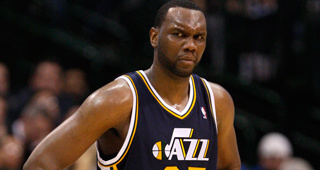There are a few misconceptions about the Charlotte Bobcats entering the 13-14 season.
- Al Jefferson is going to have a career year
On the fourth of July this past summer, news broke that Al Jefferson had agreed to a three-year, $41 million dollar contract with the Bobcats, instantly becoming the most offensively talented player in franchise history.
Fans reactions were mixed; some were ecstatic the Cats had finally got the low post scoring presence they have never had, while some were desperately disappointed that the Bobcats had blown up their tank and had decided to go back to being a middle of the road team and might potentially lose their 2014 first round pick to the Bulls (top 10 protected). Others were simply in disbelief that a marquee free agent had actually signed with Charlotte.
As the Bobcats assembled their roster and coaching staff, it became obvious that the team was going to be built around Jefferson. Due to the Bobcats lack of other scoring weapons, many fans and journalists have come to believe Jefferson will have a career year and might even be in line for his first All-Star appearance.
I disagree as Jefferson will instead meet a host of new challenges playing with a young and inexperienced team that will have to adjust to a new style of offense.
One of the major issues I see the Bobcats having is getting Jefferson the ball in the right areas. The Bobcats have always run drag screens and pick and roll offense, as they have never had a post presence worth passing the ball into.
Steve Clifford has already pointed at this being an area the Bobcats must focus on:
“The challenge for our team is the post-up (scorer) is a dependent position," said Clifford to the Charlotte Observer. "He depends on others to get him the ball. Him getting the ball where he wants it and when he wants it will be critical. That means our spacing and our ability to play out of his double-teams become critical areas, too.”
The job to get Jefferson the ball seems to be laying with the Bobcats' power forwards Cody Zeller and Josh McRoberts, two above average passers. In the early preseason games before Jefferson was injured, the Bobcats were getting the ball to either Zeller or McRoberts at the top of the key so they could feed it inside to Jefferson. This worked at first, but soon became predictable. Zeller finished with four turnovers in the first game against Atlanta as they quickly figured out how to disrupt the Bobcats' post offense. Clifford will have to become a little more creative, or the Bobcats will have to execute better if they want to get the best out of Jefferson.
The second issue that Clifford touched on in the quote above is the Bobcats' spacing. They are simply not a good shooting team and allow opposing teams to pack the paint. Out of Charlotte’s other four starters (Kemba Walker, Gerald Henderson, Michael Kidd-Gilchrist and Cody Zeller), none are above average outside shooters. That means Jefferson is going to see more double teams than ever before with opposing defenses ready to pack the paint against him. Bench shooters such as Jeff Taylor, Ben Gordon, Josh McRoberts and Anthony Tolliver must fill this void. No matter how good a team’s spacing is, it doesn’t matter if those guys can’t reliably hit outside shots.
Depending on how the Bobcats adapt to these new set of challenges set before them this upcoming season will determine the success of Jefferson. The last thing Charlotte needed was Jefferson getting injured in the preseason, which means they will have to learn on the fly during actual regular season games. I expect them to get off to a slow start, but improve throughout the season as the team becomes more accustomed to having a premier low post scorer.
- Mark Price will instantly fix Michael Kidd-Gilchrist’s jump shot
Mark Price was undoubtedly a great hire, especially for a team with so many flawed shooters. Between Price, Clifford, Patrick Ewing and Stephen Silas (very underrated) the Bobcats have assembled the most accomplished coaching staff in franchise history. However, fans seem to have a common misconception that Price will turn this team of slashers into the 2004 Phoenix Suns. Shooting comes down to muscle memory, trying to undo 15 to 20 years of repetition takes time and hard work. Even then, Price concedes some parts of shooting are simply unteachable:
“I think you can help guys be good shooters," said Price to the Charlotte Observer. "I don’t know that you can help guys be great shooters.”
Price has been focussing much of his time with Kidd-Gilchrist. Kidd-Gilchrist was the second worst midrange shooter in the NBA last season, making just 24 percent of his shots, not to mention his horrible hitch. So far Price has focussed on getting Kidd-Gilchrist to improve his footwork and square up to the basket, which should hopefully improve his consistency. Price has been reluctant to delve too deeply in a complete overhaul of Kidd-Gilchrist's form.


